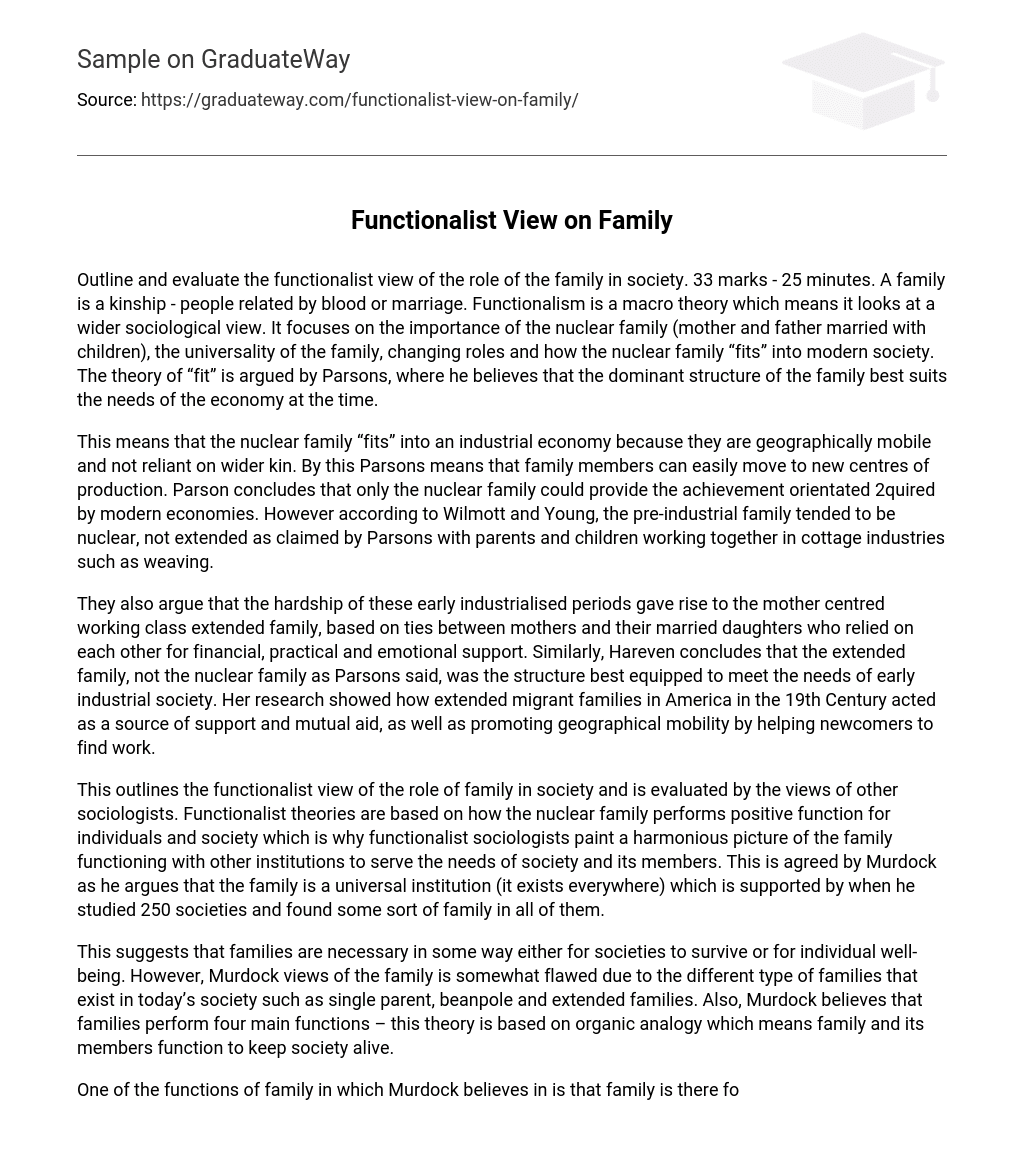Imagine a bustling city, with its interconnected streets, buildings, and people. Each element plays a vital role, contributing to the city’s overall functioning and harmony. Now, imagine a society. It too requires organized components to thrive. The family, according to functionalist theory, is one of these essential building blocks, serving as the bedrock for a stable and prosperous society. This article delves into the functionalist perspective on the family, exploring its foundational concepts and its ongoing relevance in today’s world.

Image: graduateway.com
The functionalist view of the family is grounded in the belief that social institutions like families exist to fulfill specific needs within society. These “functions” ensure order, stability, and the smooth operation of society as a whole. Imagine a well-oiled machine – each part must work in concert for the machine to run effectively. Likewise, each institution within society, from education to government, plays a critical role in the overall functioning of the social machine. The family, in particular, has long been viewed as the cornerstone of social order, providing essential services and shaping individuals from their earliest years.
A Deeper Dive into the Functionalist View
The concept of functionalism, particularly as it relates to the family, gained prominence with the work of Emile Durkheim, a pioneering sociologist. Durkheim argued that society is a complex organism, with each part contributing to its overall health. The family, he believed, plays a vital role in socialization, providing children with the values, norms, and skills necessary to become productive members of society. Furthermore, the family serves as a primary source of emotional support and intimacy, vital for individual well-being and social cohesion.
Another key contributor to functionalist thought, Talcott Parsons, expanded on Durkheim’s ideas. Parsons argued that the nuclear family, consisting of a married couple with children, is the most functional unit for modern society. He identified several key functions of the family:
- Socialization: As children grow, the family serves as the primary incubator for teaching values, norms, and behaviors, preparing them for their future roles in society.
- Emotional Support: The family provides a safe haven for individuals, offering love, companionship, and a sense of belonging.
- Economic Support: The family historically served as a unit of production, with families working together to provide for their needs. In modern societies, it often acts as a cooperative economic unit, with members pooling resources and supporting each other financially.
- Reproduction: The family is responsible for procreation, ensuring the continuation of society.
- Status Transmission: The family plays a role in transmitting social status and position to its members, contributing to the overall social structure.
However, it is crucial to acknowledge that the functionalist view of the family has faced criticism for its simplistic approach and implicit assumptions. Some critics argue that it ignores power dynamics within families, particularly gender inequality and the potential for abuse. They also point out that the functionalist perspective has often been used to justify traditional family structures, potentially overlooking diversity and the multitude of family forms present in society.
Functionalism and the Modern Family
Despite its critiques, the functionalist perspective remains influential in understanding the family’s role in society. Even today, many of the original functions attributed to the family by functionalist thinkers remain relevant. However, the modern family has evolved significantly, with a greater emphasis on individual choice, diverse family structures, and changing societal norms.
The rise of dual-income households, single-parent families, same-sex couples, and blended families showcases the evolving nature of family life. While these modern variations might not perfectly fit the traditional functionalist model, they still demonstrate the enduring importance of family structures, albeit in more diverse and nuanced forms.
Moreover, functions once solely attributed to the family, such as socialization and economic support, are now increasingly shared by other institutions. Schools, workplaces, and community organizations contribute to the socialization process, while government programs provide economic support in various forms.
Expert Insights and Actionable Tips
Dr. Susan Brown, a renowned sociologist specializing in families, highlights the importance of recognizing the multiple functions served by the modern family. She emphasizes:
“The family is not a one-size-fits-all institution. It has always been dynamic and adaptable, responding to changing social conditions. It’s essential to appreciate the diverse forms that families take and the crucial roles they continue to play in the lives of individuals and society as a whole.”
From a functionalist lens, we can appreciate the enduring relevance of the family in its various forms. To strengthen this vital societal institution, consider:
- Nurturing Strong Family Bonds: Spend quality time with loved ones, fostering deep emotional connections and strengthening family relationships.
- Promoting Open Communication: Encourage open dialogue and active listening within the family, fostering understanding and resolving conflicts.
- Supporting Family Values: Teach children about respect, empathy, and responsibility, building a foundation for healthy relationships and community engagement.

Image: vdocument.in
Functionalist View Of The Family
Conclusion
The functionalist perspective provides a valuable framework for understanding the family’s significant role in society. While contemporary family structures have evolved, the core functions identified by functionalist thinkers remain relevant. By acknowledging the diversity of modern families and appreciating the ongoing importance of strong family units, we can ensure that families continue to thrive as vital building blocks for a robust and thriving society. Share your experiences with families in various forms, and let’s continue the discourse on the evolution of this fundamental social institution.






